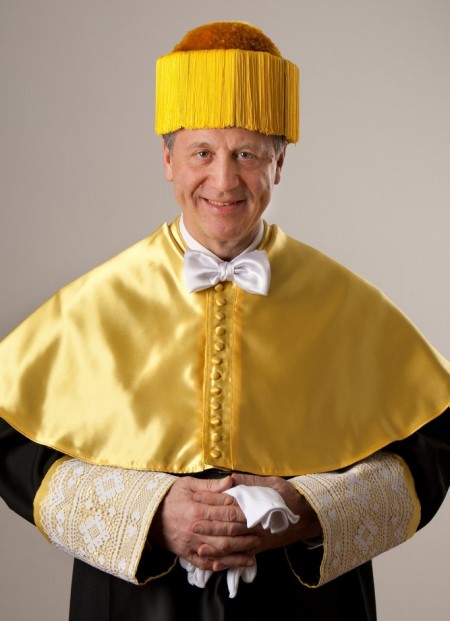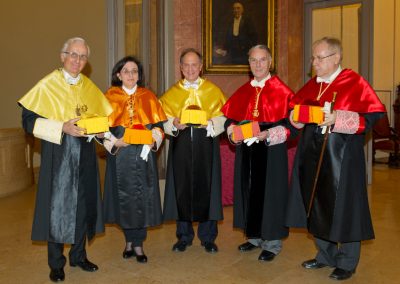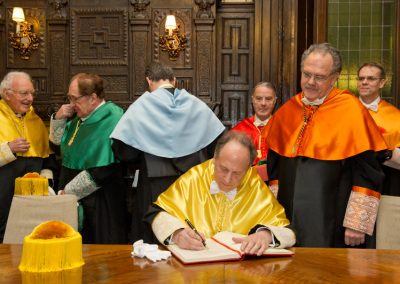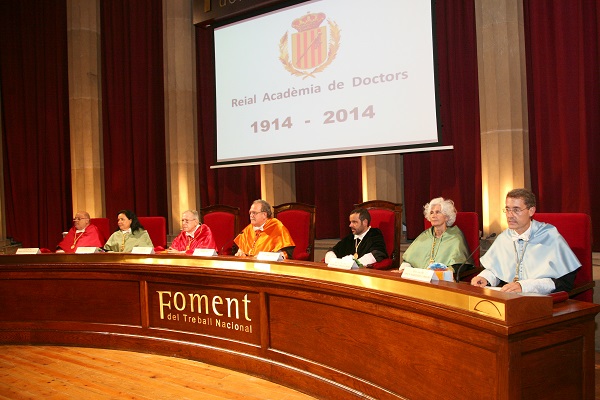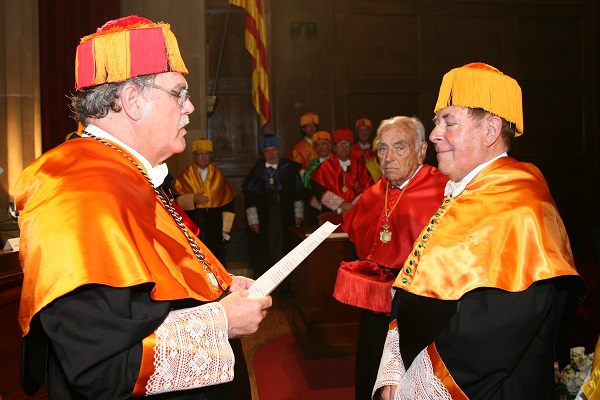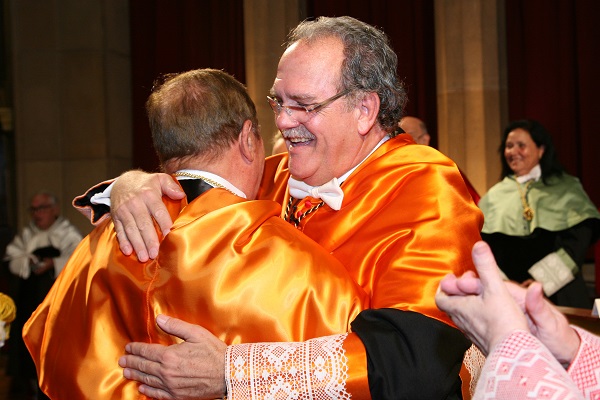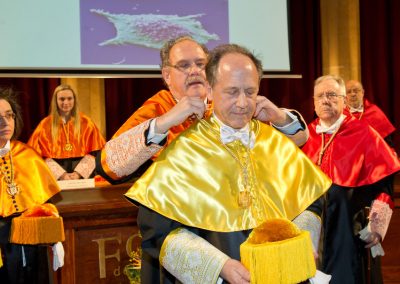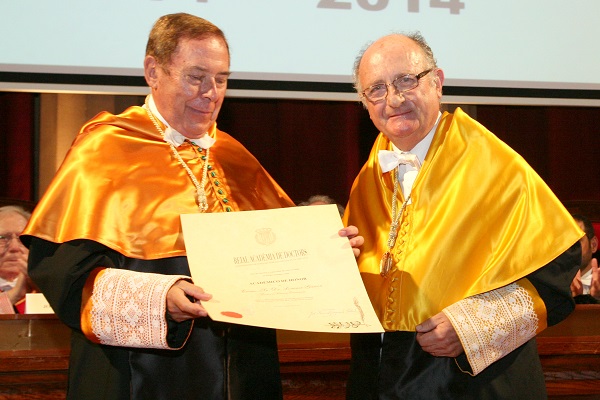Supernumerary Member
Health Sciences: Dr. in Medicine
Date of admittance: 25/02/2014
Admission Speech: La participació del Sistema Nerviós en la producció de la sang i en el procés cancerós
From Dr. Pere Gascón Vilaplana, has been a lecturer in the University of Barcelona since 2009 and coordinator of the Oncology Clinic since 2003. He is also the director of the Medical Oncology and Scientific Coordinator of the ‘Clinical Institute of HematoOncological Diseases (ICMHO) at the Hospital Clínic de Barcelona. In 1974 he obtained the title of Graduate in Medicine and Surgery from the University of Barcelona and is named Non-permanent Professor in the Chair of Pharmacology and Clinical Therapeutics of the Faculty of Medicine of the same institution. In 1975 he moved to the United States to continue his scientific and clinical training. For two years he works as an associate researcher at the Department of Pharmacology of the New York University Medical Center, where he worked the Spanish Nobel Prize Professor Severo Ochoa, where he was to announce the award. In this institution, considered among the 5 best Faculties of Medicine of the United States, he worked with Prof. José Musacchio, a former disciple of Professor Julius Axelrod, Nobel Prize in Medicine in 1970. From the results of these investigations, his doctoral thesis on encephalic-endorphin arises, part of which was published in the journal Science. Her academic background will be completed as of the year 1977 in public hospitals of the Brooklyn Downstate Medical Center system in New York, to later go to the National Institutes of Health of Bethesda (NIH), at the Clinical Hematology Branch. This institution is considered the most important in the world in biomedicine. Dr. Gascón was chosen from hundreds of American candidates who appeared after an announcement appeared in the New England Journal of Medicine to cover a clinic, an extremely competitive and prestigious place, every year only 6 candidates are selected the country . Dr. Gascón was the first Spanish in the history of the NIH to be a Clinical Associate. It is estimated that more than 30 American Nobel Prizes have been Research or Clinical Associates of the NIH, at moments of his life. In this prestigious institution he was chosen for merit competition and after undergoing 16 interviews with scientists such as: Marshal Nirenberg, Nobel Prize in Medicine in 1968, Bruce Chabner (Director of Pharmacology of the National Cancer Institute (NCI) and currently chairman of the Massachusetts Department of Medicine’s General Hospital, the Harvard Medical School’s university hospital, Robert Young (Director, Medical Oncology Branch, NCI), Eli Glastein (Director, Radiation Oncology, NCI) and Arthur Nienhuis (Director, Hematology Branch, National Heart, Lung and Blood Institute, NIH). During his years of training at this prestigious institution, they worked on the same campus in April, the Nobel Prizes, in the aforementioned Professor Marshal Niremberg. Professors Julius Axelrod, Nobel Prize for Medicine 1970, Christian B. Anfinsen, Chemistry Nobel Prize 1972 and Carleton Gajdusek, Nobel Prize Medicine 1976. The NIH was trained with the Drs. Arthur Nienhuis and Neal Young (current director of the Clinical Hematology Branch of the NHLBI, NIH). After four years in this prestigious center, he moves to the Washington University-Barnes Hospital of Saint Louis forming with the Drs. Stuart Kornfeld and Phillip Majerus, both members of the National Academy of Sciences, where he completes his specialization as a hematologist and oncologist. This institution, considered Harvard of Middle West, has given several Nobel Prizes during its history: Carl Ferdinand Cori and Gerty Teresa Ferdinand Cori both Nobel Prize laureates Medicine in 1947, Severo Ochoa, Nobel Prize Medicine 1959, Rita Levi-Montalcini and Stanley Cohen both the 1986 Nobel Medicine Awards. In 1985, at the age of 36, he joined the faculty of the UMDNew Jersei Medical School as Head of the Hematology Service and in 1989 he was promoted to Head of the Hematology-Oncology Division. In 1991 he obtained the title of Associate Professor with a place of life (tenure) and in 1997 the Full Professor, which is the highest category in the academic world of the United States. It would be equivalent to Full Professor in Spain. In 1995, he was selected as the New Jersey State Physician by the American College of Physicians. In 1999 and after 24 years in the United States he returned to Spain to take charge of the place he currently occupies in the Hospital Clínic. He is the author of 161 peer reviewed publications, with an Impact Factor of 823, as well as multiple revisions and book chapters. Dr. Gascón is also a diplomat for the American Board of Internal Medicine in the specialties of Internal Medicine, Hematology and Medical Oncology. He is also a member of the prestigious alpha-Omega-Alfa Honor Society, which is the only honor company in the field of medicine in the United States. Among other charges,by President of the Oncology Section of the Academy of Medical Sciences of Catalonia and the Balearic Islands, and is currently a member of the Scientific Committee of the Spanish Association against Cancer of Barcelona and member of the Board of Directors of the ” Spanish Association for Research against Cancer (ASEICA). Their scientific contributions in the field of neurotransmitter neuropereptides as well as their role in hematopoietic regulation will be highlighted. His research has led to the formation of a new field of biology, for which he coined the term neurohematology. His hypothesis considers that the nervous system, through its innervation in the bone marrow and its soluble factors (neuropeptides / neurotransmitters) regulates blood production. His research has focused on the TAC-I gene and human tachykinins (SP, NK-A). This concept and references to Dr. Gascón appears already in the most important Hematology books of the United States (Williams and Wintrobe). Another of his contributions has been in the field of myofibrosis. Also, it is monocyte / macrophage theory and TGF-β as a cell and factor involved in the pathogenesis of this disease. Currently, his research focuses on the role of neuropeptides / tachykinins in tumor genesis, having discovered an autocrine regulation in the breast cancer cells mediated by the SP and its NK-I receptor. This finding has led him to postulate an innovative metastatic mechanism to the bone whereby tumor cells would be found in the bone tissue / bone marrow with a favorable environment for implantation that is also regulated by tachykinins and other haematopoietic factors. His theory would also explain why cancer cells may be “hibernating” in certain tissues or organs of the body for years to recover their activity at a given time. His latest research confirms a role of the nervous system (neuropeptides and neurotransmitters) in the development of the tumor process, which has led him to baptize this field of biology as Neuro-Oncology. His scientific interests in the field of Oncology focuses on the role of microenvironment in the tumor and metastatic process, in the growth factors and their transcription factors involved in the process, and in tumor immunology

